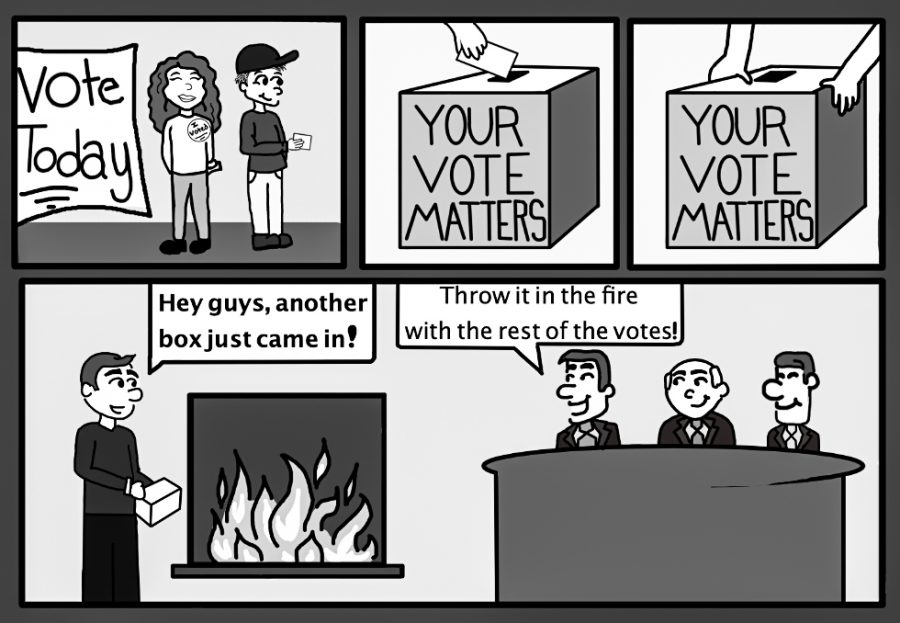OPINION: Removing Electoral College is improbable, not worth pursuing
Republican support for Electoral College makes change highly unlikely
LAUREN PETTIT | DAILY EVERGREEN ILLUSTRATION
The Electoral College seems like a good system, but gives electors the chance to ignore their state’s popular vote and give their vote to whomever they want, making their constituents’ votes irrelevant. These electors are called “faithless electors” and they negatively impact our democratic process.
November 19, 2019
Removing the Electoral College could be a step in the right direction for American democracy. The removal of the college is nearly impossible, however, making it not worth pursuing.
In U.S. history the winner of the popular vote has lost the Electoral College five times, and this has happened twice in the past 16 years. Since 2000, this has been a controversial topic.
“Most of the energy on removing the Electoral College is focused on something called the interstate compact,” said Cornell Clayton, WSU Thomas S. Foley distinguished professor of government, “which is an agreement that states would enter into in which they would pledge to give all of their electoral votes to the winner of the popular vote.”
If enough states join the interstate compact to create a combined total of more than 270 electoral votes, the electoral college would effectively be overridden, since the majority of votes will go to the winner of the popular vote.
The reasoning behind this compact makes sense.
According to Fairvote.org, of the 28 freest nations on earth 21 require the president to win more than 50 percent of the votes. Six nations require a plurality of votes and only one country, the United States, allows the loser of the popular vote to become president.
If the vast majority of the freest nations requires the most votes to become president why shouldn’t the United States?
While the idea of removing the Electoral College is rooted in legitimate evidence, the movement has one fundamental flaw: reality.
According to nationalpopularvote.com, the current interstate compact has been passed in 15 states and the District of Columbia, totaling 196 electoral votes, far short of the 270 needed to take effect. On top of that, the only states to pass the interstate compact are Democrat strongholds, no swing states or Republican states have passed the compact.
Even if the compact gets the necessary electoral votes to come into effect, it is still an uphill battle.
The Congressional Research Service found in a 2019 report that, “some observers maintain that it must be approved by Congress, because it is an interstate compact that would affect key provisions of constitutional presidential election procedures.”
Right now, the compact would fail in Congress given the Republican control of the Senate. Four of the five times where the president won the Electoral College and not the popular vote, it put a Republican in the Oval Office.
Another failure the compact could face would be a judicial challenge in the Supreme Court.
“It’s doubtful if [the interstate compact] would even go into effect,” said Michael Salamone, WSU associate professor with a specialization in judicial politics.
Whether it fails to get the necessary votes or is shot down by Congress and the Supreme Court, the interstate compact will not go into effect anytime soon.
The removal of the Electoral College is unlikely to happen, but there is some bipartisan possibility to fix one problem of the college: faithless electors.
A faithless elector is someone who is appointed to the Electoral College who then proceeds to not vote with the state’s popular vote.
“If we never replace [the Electoral College], I just want to solve the problem of faithless electors,” said Bailey McCoy, member of Young Democrats of WSU, who previously debated for the removal of the College last spring.
Blaine Ross, president of the WSU College Republicans, also said he thinks faithless electors should be removed.
“Electors shouldn’t be so willy nilly to throw their vote around,” Ross said.
We should focus on bipartisan solutions to constitutional problems such as faithless electors or an electoral college that doesn’t vote with the people.
Trying to fix the Constitution through heated, unrealistic and partisan fervor doesn’t help anyone.










Richard Winger • Nov 20, 2019 at 2:09 pm
The U.S. Supreme Court ruled long ago that not all interstate compacts need congressional approval. There are thousands of interstate compacts in force that Congress has never approved.
The proponents of the National Popular Vote are free to use the initiative process to pass the plan in states that haven’t passed it yet.